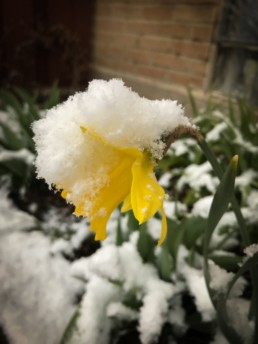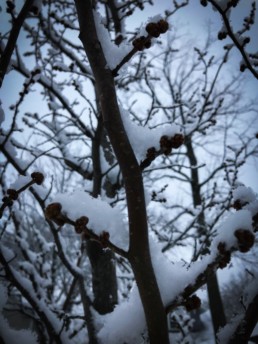The book of Ecclesiastes reminds us that everything has its season. Here in the Upper Midwest, April is no longer the season for snow because we, the hardy and weary residents of these northern climes, have decided it is so. November snow is not unexpected; we settle in for the long months ahead, build a fire, and get on with it. Snow in December is welcome and festive; it decorates the trees and the Christmas lights and provides a legitimate backdrop to carols and cups of hot cocoa. Many of us would perhaps like to hibernate through January and February but that cannot be so; we bundle up and trudge through, zombie-like, to March. Nothing special is expected from March, but by April we should be solidly into spring; daffodils blooming, trees budding, and the other usual hallmarks that show we have not yet fallen into another Ice Age.
A snowy Monday morning in April does nothing good for our fragile patience. We commiserate and share photos of blanketed branches and miserable commutes. We inhabit every Midwestern stereotype and talk about the weather, not because we need a topic for idle chit-chat, but because we have been bound together in some strange survival scenario. We can’t change our fate, but the camaraderie does help to anchor one’s sanity.
There is an appointed time for everything, and a time for every affair under the heavens.
Ecclesiastes 3:1

The thing about April snow is that it does not last. Heavy, wet flakes pile neatly on branches and blooms, wrapping the neighborhood in a soggy morning shroud. By noon it will have melted, and the trembling blooms and dripping branches make us smile and proclaim, if only to convince ourselves, that this was really the end of it. Nevermind a forecast whose wild temperature swings look like the sawtooth heart rhythm of the dying – 70 degrees on Wednesday, 30 degrees by the weekend and perhaps more snow. We are too wise (and perhaps jaded) to believe that spring – real spring – has arrived and is here to stay. We are too desperate to believe otherwise.
And yet, even as we endure a few more days or weeks of this freeze-thaw cycle, adding a few more creeping cracks to sidewalks and gaping holes to salt-crusted streets, a gritty kind of faith takes hold. This faith is different from November’s melancholy belief that spring will arrive again with the tilting of the earth and flipping of the calendar. Rather, it is patient understanding that this, too, sometimes is the way of things. What feels like a catastrophe to me in the morning is likely to melt by noon; the sun half-hidden behind drifting clouds is stronger than I acknowledge. Changes and seasons, in weather and in life, continue on in stutter-step and surprise, nudging and sometimes dragging me along in a current and purpose I do not see.

What feels like a catastrophe to me in the morning is likely to melt by noon; the sun half-hidden behind drifting clouds is stronger than I acknowledge.
I find myself back in Ecclesiastes, whose desert-dwelling author understood that there is “an appointed time for everything, for every affair under the heavens.” He did not know the wide expanse of the earth and its inhabitants, yet this one truth, mooring one person in a particular time and place, found its way into splintered faith and cracked hope in lands and people and a future beyond imagination.
If this ancient wisdom is true of the grandest and gravest moments in our shared human existence; if there is indeed a time for mourning and dancing, seeking and losing, killing and healing, war and peace – then I can allow for the insignificant hiccups and inconveniences of a day or a life not proceeding as planned. I can wait for warmer days; I can believe in spring.